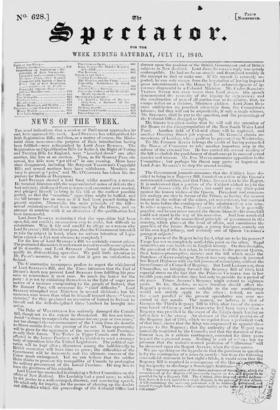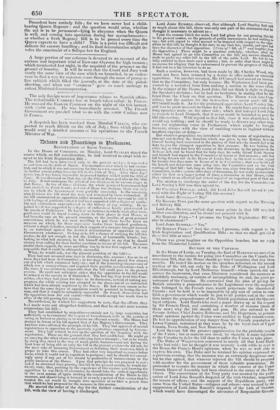The Government journals announce that the Cabinet have de-
cided to bring in a Regency Bill, founded on a view of the Queen's matrimonial condition, and that Prince A moner is to be the Regent. It is UnderStooti that a portion of' the Cabinet wished to join the Duke of Sessrax with the Prince, but could not clay their point against the known wishes of the Queen. Precedent and common- law analogy are also in favour of the Prince, as having the nearest. interest in the welfare of the minor, yet non-existent, but essaamed to be born before the contingency of his administrntion can arise. In other respects, too, Prince A Leiner is eligible : he is generally popular, and he can never ascend the throne himself—his own child could not stand in the way of his accessi(m. And how wonderful is the working of the monarchical principle of government in this country, which places at the head of' afildrs, and constitutes the guardian of' the future Sovereign, a young foreigner, scarcely out of his own legal inflincy, and certainly one of Queen VICTORIA'S youngest saijects!
The person of the Regent being fixed, what are to be his powers?
Usage has not so completely settled this point as the other. Regal ndnorities are rare incidents in English history. On first thoughts, the precedent of the lest reign, in reference to the present Queen, then heiress-presumptive, occurs: and the bill which made the Dutehess of Kiesr contingent Regent was very simple—it invested her Royal :Highness with the full powers of sovereignty, without the incumbrance of a Council of Regency. lint Lord LYNDHURST, then Chancellor, on bringing forward the Regency Bill of I tiaO, laid especial stress on time fact that the Princess Vurroama was in her twelfth year, and therefore they had only to provide for a period of six years. Prince Ammer's Regency might extend to eighteen rears. So Ihr, therelbre, as mere duration should affect the 'Regent's powers, a measure suitable to the one contingency
mild not strictly apply to the other : indeed, no case
the cemet parallel of the present speculative one ever oc- curred in our annals. The nearest, we believe, is that of G nom; n the Third's Regency Bill in 1763, after two of time nume- rous brood of Ginnie Land CHAI1LOTTE 11:I. 1 been born ; when it Regency was provided in the event of the I:ing's death leaving an infant lick to the crown. An abatract of the chief provisions of the Regency Act of I 765, which we reprint froal a periodical work of that time, shows that the King was empowered to appoint three persons to the Regency ; that the authority of' time Regent was materially restricted by the Council ; and that tile duration of' Par- liament was, in a certain contingency', extended for three years beyond the septennial term. Nothing is said of st!', try ; but we presume that the nation's wonted profusion of " allowance" will be showered upon the Regent Amnaer, when the lime conies.
We are speaking on the hypo:heads that the pro% ision in question
IS fin. the contingency of It .nduos ll,ij it : Ina fisnn the following semi-official statement in last night's Glube, it would seem that the Regency Bill is required in consequence of the Queeis's big incapacity to discharge a Sovereign's fun6tions—:', " The temporary suspensimt of the duties and cares of sovew ty,„whietilfies CPss ores/Fawn/ea of leer stajada Han OrOC:O:(1141.11 inpose OIL her, AliretTurao be rti provided for by a Regency MIL '11w Cabinet, after deep nini c &Alberti- prince stitt■ert. Hon, hare, it is LA, agreed to a hegent, 111 the persomp A bill containing the neee,i,ary provisions s II be fortloviOg rro aced, cud ' piursed through both Howes with 111 touch facility as the lams of arbsasea£ Ak•
, •
;4 • ;.. will admit." ••
. (
Precedent here entirely fails ; for we have never had a child- bearing Queen Regnant : and the question would arise, whether the act is to be permanent—lying in abeyance when the Queen is well, and coming into operation during her aecouchements- or whether a fresh Regency Bill is to be passed every time the Queen expects to have a child? This is a point too difficult and delicate for cursory handling ; and its final determination might in- volve the enactment of a Salique law for England.



























